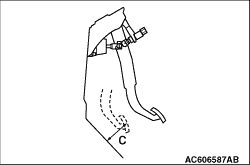|
|
1.Turn up the carpet, etc.
under the brake pedal.
|

|
2.Measure the brake pedal
height as illustrated.
Standard value
(A):
192 - 195 mm <L.H. drive
vehicles>
187 - 190 mm <R.H. drive
vehicles>
|


|
3.If the brake pedal height
is not within the standard value, follow the procedure
below.
(1)
Disconnect the stop lamp switch connector.
(2)
Loosen the stop lamp switch by turning it approx. 1/4
turns anticlockwise.
(3)
Remove the brake pedal and pedal support member (Refer to  ). ).
(4)
Adjust the brake pedal height by turning the clevis.
(5)
Install the brake pedal and pedal support member (Refer to
 ). ).
(6)
Push the stop lamp switch until its thread touches the
stopper. Then secure the switch by turning it clockwise
approximately 1/4 turns. During this work, pull the
brake pedal towards you to hold.
(7)
|
|
| caution |
Check that the
stop lamp does not illuminate when
the brake pedal is not
depressed.
|
|
Connect the connector at the stop lamp
switch.
4.Return the carpet, etc.
|
|
|
1.Turn the ignition switch
ON, and fully accumulate the brake fluid in the HBB
accumulator.
| note |
If the brake fluid is not
fully accumulated in the accumulator, the pump
motor will start to run. When the accumulator is
fully accumulated, the pump motor stops. When
the brake fluid is accumulated in the
accumulator, the pump motor does not
run.
|
|

|
2.Operate the pedal by hand,
and check that the pedal stroke (free play) meets the
standard value at the point where resistance is
felt.
Standard value (B): 3 mm or
less
3.If the brake pedal play is not
within the standard value, check the following, and adjust
or replace if necessary:
- Excessive play between the brake pedal and the
clevis pin, or between the clevis pin and the brake
booster operating rod
- Installation position of the stop lamp switch,
etc.
|

|
1.Turn the ignition switch
to the "LOCK" (OFF) position, depress the brake pedal two or
three times. After eliminating the vacuum in the brake
booster, press the pedal down by hand, and confirm that the
amount of movement before resistance is met (free play) is
within the standard value range.
Standard value
(B): 3 - 8 mm
2.If the brake pedal
play is not within the standard value, check the following,
and adjust or replace if necessary:
- Excessive play between the brake pedal and the
clevis pin, or between the clevis pin and the brake
booster operating rod
- Installation position of the stop lamp switch,
etc.
|
|
|
1.Turn up the carpet etc.
under the brake pedal.
|

|
2.Start the engine, depress
the brake pedal with approximately 490 N of force, and
measure the clearance between the brake pedal and the
floorboard.
Standard value
(C):
85 mm or more <Short
wheelbase, Long wheelbase-2 800, 3 000>
80
mm or more <Long wheelbase-3 200, 3
800>
3.If the clearance is
outside the standard value, check for air trapped in the
brake line and thickness of the disc brake
pad.
4.Return the carpet, etc.
|




